Washington D.C. – Trump Additional Tariff Remarks delivered a decisive blow to India-US trade relations when President Donald Trump categorically ruled out any possibility of trade negotiations with India until existing tariff disputes are completely resolved. The stark declaration came during a White House interaction where Trump’s response to a reporter’s question about increased trade negotiations was met with a dismissive shoulder shrug and a firm “No, not until we get it resolved.”
These Trump Additional Tariff Remarks represent a significant escalation in the ongoing trade dispute between the world’s largest democracy and the United States. The comments underscore Trump’s unwavering stance on trade policy and his administration’s commitment to using economic pressure as a diplomatic tool.
Punishing 50% Tariff Structure Explained
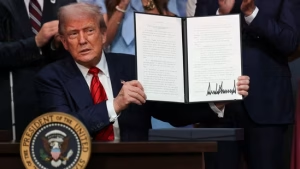
The United States has currently imposed what many economists describe as punishing 50% tariffs on India, creating a complex two-phase implementation strategy that maximizes economic pressure. Half of these substantial tariffs came into effect on Thursday, immediately impacting various sectors of Indian exports to the American market.
The remaining portion of these comprehensive tariffs, specifically imposed as a penalty for India’s continued oil purchases from Russia, will become effective from August 27. This staggered approach ensures sustained economic pressure while giving India time to reconsider its energy procurement policies.
Trump Additional Tariff Remarks emphasize the administration’s strategic use of economic tools to influence foreign policy decisions, particularly regarding countries that maintain trade relationships with Russia during ongoing geopolitical tensions.
Russian Oil Purchases Trigger Additional Penalties
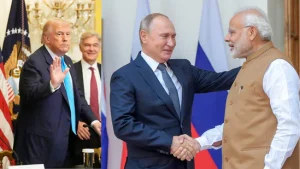

The White House issued a comprehensive executive order on Wednesday, announcing an additional 25% tariff specifically targeting India for conducting business with Russia. According to the official statement, India’s energy trade with Russia “undermines US efforts to counter Russia’s harmful activities” in the current global landscape.
The executive order specifically addresses India’s practice of purchasing Russian oil and subsequently reselling it on international markets. Trump Additional Tariff Remarks about this practice indicate the administration’s view that India’s “subsequent reselling of this oil on the open market, often at significant profit, further enables the Russian Federation’s economy to fund its aggression.”
This reference to Russia’s invasion of Ukraine provides context for the administration’s decision to target countries maintaining economic relationships with Moscow, regardless of historical trade partnerships or strategic considerations.
Strategic Economic Deterrence Policy
The Trump administration’s approach reflects a broader strategy of economic deterrence designed to isolate Russia’s economy through secondary sanctions on trading partners. Trump Additional Tariff Remarks suggest that President Trump views the 25% tariff as an effective tool to “deter countries from supporting the Russian Federation’s economy through oil imports.”
The administration explicitly stated its intention to “impose serious economic consequences on the Russian Federation for its ongoing aggressions” by targeting countries that continue energy trade with Moscow. This approach represents a significant shift in how the United States approaches allies and partners who maintain independent foreign policy positions.
Trump Additional Tariff Remarks indicate that the administration is prepared to sacrifice traditional bilateral relationships in pursuit of broader geopolitical objectives related to isolating Russia economically.
Prime Minister Modi’s Defiant Response
Prime Minister Narendra Modi responded to the tariff announcements with remarkable defiance, emphasizing India’s commitment to protecting its agricultural sector regardless of economic consequences. Speaking after the US announced the total 50% tariffs, Modi made it clear that India would never compromise on farmer interests.
Also Read: PM Modi Farmers First Speech At M.S. Swaminathan Conference; A Bold Address
Trump Additional Tariff Remarks about trade negotiations being impossible until disputes are resolved were met with Modi’s declaration that farmers’ interests represent his “top priority.” The Indian Prime Minister’s response demonstrated remarkable resolve in the face of significant economic pressure.
Modi’s statement that India was “ready” to “pay a heavy price” for protecting farmer interests reflects the domestic political considerations that influence international trade policy decisions.
Agricultural Sector Protection Priority
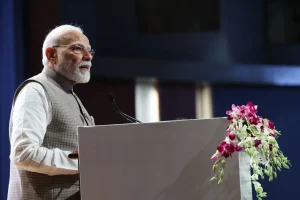

The Indian Prime Minister’s emphasis on agricultural protection reveals the domestic political calculations underlying India’s response to American trade pressure. Modi specifically mentioned farmers, fishermen, and dairy farmers as constituencies whose interests cannot be compromised despite potential economic consequences.
Trump Additional Tariff Remarks about halting trade negotiations appear to have strengthened Modi’s resolve to protect these vulnerable sectors. The Prime Minister’s declaration that “India will never compromise on the interests of farmers, fishermen and dairy farmers” suggests that domestic political considerations may outweigh international trade pressures.
This stance indicates that Trump Additional Tariff Remarks may have inadvertently strengthened Indian domestic political support for the government’s independent foreign policy approach.
Economic Consequences and Strategic Implications
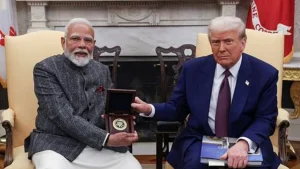

The standoff between the United States and India represents a significant shift in bilateral relations that have historically been characterized by strategic partnership despite occasional trade disputes. Trump Additional Tariff Remarks suggest that the current administration prioritizes immediate compliance with American foreign policy objectives over long-term strategic relationships.
The economic implications of sustained 50% tariffs could significantly impact various sectors of the Indian economy while potentially raising costs for American consumers dependent on Indian goods and services.
Future Diplomatic Prospects
Trump Additional Tariff Remarks indicate that resolution of the current dispute will require significant policy changes from India regarding its energy procurement strategies and broader relationship with Russia. The administration’s firm stance suggests limited flexibility in current negotiations, potentially prolonging economic tensions between the two nations.
The situation represents a critical test of India’s commitment to strategic autonomy versus economic pragmatism in managing relationships with major powers during periods of global tension.

